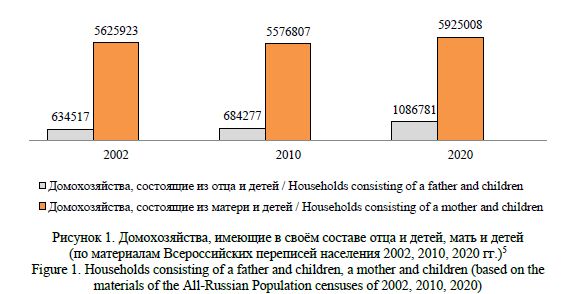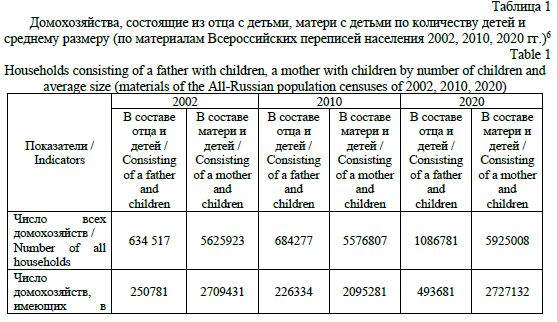Single fathers in Russia: social status and problems
This article presents a review of theoretical and methodological approaches to single fatherhood in foreign and Russian scientific literature. It also analyses statistical and demographic data on the prevalence of paternal families in Russia, studies the causes of the formation of single-father families, and examines their social status and problems. The author has сonducted content analysis of normative legal documents, materials from online communities on social media, and media publications. The article demonstrates that at the present stage, there is a diversification of family structures, including an increase of the proportion of single-parent paternal families. This phenomenon expands the traditional gender and paternal roles of men due to the emergence of new identities of the sole caregiver, the only person caring for children. The author has concluded that there is a need to clarify the concepts of “single father”, “single parent”, and “persons raising children without a mother” in legislation. A detailed examination of the underlying causes of the emergence of single-father families, the challenges they encounter, and the social infrastructure supporting single fathers has highlighted the necessity for the development of a novel national standard, namely “Social services for the population”. The term “social services for men” encompasses the scope and nature of social services for single fathers. The author underscores the necessity for unification of the activities of social institutions in regard to their work with single fathers, as well as the importance of training employees of social institutions working with families in contemporary standards, tools, and methods of work that take into account the specific needs and problems of paternal families and children.
Figures




Natsak, O. D. (2024), “Single fathers in Russia: social status and problems”, Research Result. Sociology and Management, 10 (4), 144-166. DOI: 10.18413/2408-9338-2024-10-4-0-8


















While nobody left any comments to this publication.
You can be first.
Bezrukova, O. N., Samoilova, V. A. (2020), “Fatherhood and support for fathers: trends in modern foreign research”, Monitoring obshhestvennogo mnenija: jekonomicheskie i social'nye peremeny, (4). 233-272. DOI: https://doi.org/10.14515/monitoring.2020 .4.948. (In Russian)
Egorova, N. Y., Yanak, A. L. (2014), “The single-father family as a new client of social work”, Vestnik of Lobachevsky State University of Nizhni Novgorod. Series: Social Sciences, (2), 42-46. (In Russian)
Popov, V. A., Anikina, R. V. (2014) “The social and legal status of single fathers in Western Europe, the USA and Russia”, Theory and practice of social development, (8), 73-75. (In Russian)
Romanova, N. P., Mikhailova, A. I. (2014), “Features of the social well-being of single fathers as a determinant of the formation of a strategy for managing paternal families”, Vestnik Zabajkal'skogo gosudarstvennogo universiteta, (10), 81-92. (In Russian)
Romanova, N. P., Mikhailova, A. I. (2013), “Features of social management of single-parent (paternal) families”, Vestnik Zabajkal'skogo gosudarstvennogo universiteta, (10), 47-60. (In Russian)
Rostovskaya, T. K. (2023a), “On the development of an Action Strategy for saving men and supporting responsible fatherhood: the author's view”, Bulletin of the South-Russian State Technical University (NPI). Series: Socio-Economic Sciences, 16 (1), 40-47. DOI: https://doi.org/10.17213/2075-2067-2023-1-40-47 (In Russian)
Rostovskaya, T. K. (2023b), “The role of men in modern Russian society”, Sociological Studies, (4), 159-160. DOI: https://doi.org/10.31857/S013216250025455-3 (In Russian).
Rostovskaya, T. K. (2023c), “Strategy of actions to save men and support responsible fatherhood”, DEMIS. Demographic research, 3 (2), 168-171. DOI: https://doi.org/10.19181/demis.2023.3.2.13. (In Russian).
Rostovskaya, T. K., Vasilyeva, E. N. (2023), “The social portrait of single fathers: an analysis within the framework of the concept of responsible parenthood”, Social Area, 9 (1), 1-15. DOI: https://doi.org/10.15838/sa.2023.1.37.2. (In Russian)
Rostovskaya, T. K., Natsak, O. D. (2024), “Single-parent family in the context of modern demographic concepts”, Social Area, 10 (2), 1-11. DOI: https://doi.org/10.15838/sa.2024.2.42.10 (In Russian)
Sitnikova, V. V., Kuznetsova, E. K. (2011), “Social work with paternal families”, Vestnik Amurskogo gosudarstvennogo universiteta. Serija: Gumanitarnye nauki, (54), 62-66. (In Russian)
Stasenko, O. V. (2010), “Single fatherhood in modern society: causes and main problems”, Woman in Russian society, (3), 78-82. (In Russian)
Shevchenko, I. O. (2014), “Single fathers in Russia: everyday practices and problems”, RGGU BULLETIN. Series Philosophy. Social Studies. Art Studies, (4), 163-172. (In Russian)
Shevchenko, I. O. (2015), “The situation after the divorce: fathers and children”, Sociological Studies, (3), 70-77. (In Russian)
Shevchenko, I. O. (2023), “Evolution of scientific research on fatherhood”, The Bulletin of the Institute of Sociology, 14 (3), 175-196. DOI: https://doi.org/10.19181/vis.2023.14.3.12. (In Russian)
Coles, R. (2015), “Single-Father Families: A Review of the Literature”, Journal of Family Theory & Review, 7 (2), 144-166. DOI: https://doi.org/10.1111/jftr.12069.
Dhungel, B., Kato, T., Kachi, Yu., Ochi, M., Gilmour, S. and Takehara, K. (2023), “Prevalence and Associated Factors of Psychological Distress Among Single Fathers in Japan”, Journal of Epidemiology, 33 (6), 294-302, DOI: https://doi.org/10.2188/jea.JE20210273.
Geisler, E. and Kreyenfeld, M. (2019), “Why Do Lone Mothers Fare Worse than Lone Fathers? Lone Parenthood and Welfare Benefit Receipt in Germany”, Comparative Population Studies - Zeitschrift für Bevölkerungswissenschaft, (44), 61-84, DOI: https://doi.org/10.12765/CPoS-2019-09en.
Fallesen, P. and Gähler, M. (2020), “Family type and parents’ time with children: Longitudinal evidence for Denmark”, Acta Sociologica, 63(4), 361–380, DOI: https://doi.org/10.1177/0001699319868522.
Herke, M., Knöchelmann, A. and Richte, M. (2020), “Health and Well-Being of Adolescents in Different Family Structures in Germany and the Importance of Family Climate”, International Journal of Environmental Research and Public Health, (17), 1-12. DOI: https://doi.org/10.3390/ijerph17186470.
Iztayeva, A. (2021), “Custodial Single Fathers before and during the COVID-19 Crisis: Work, Care, and Well-Being”, Social Sciences, (10), 1-23, DOI: https://doi.org/10.3390/socsci10030094.
Kiernan, K., Crossman, S. and Phimister, A. (2024), “Families and inequalities”, Oxford Open Economics, (3), i645–i677, DOI: https://doi.org/10.1093/ooec/odad03.
Li, X. (2020) “Fathers’ Involvement in Chinese Societies: Increasing Presence, Uneven Progress”, Child Development Perspectives, (14), 150-156, DOI: https://doi.org/10.1111/cdep.12375.
Lu, Yu-Ch., Walker, R., Richard, P. and Younis, M. (2020), “Inequalities in Poverty and Income between Single Mothers and Fathers”, International Journal of Environmental Research and Public Health, (17), 1-15, DOI: https://doi.org/10.3390/ijerph17010135.
Philip, G., Youansamouth, L., Bedston, S., Broadhurst, K., Hu, Ya., Clifton, J. and Brandon M. (2020),“I Had No Hope, I Had No Help at All”: Insights from a First Study of Fathers and Recurrent Care Proceedings”, Societies, (10), 1-12, DOI: https://doi.org/10.3390/soc10040089.
Smock, P. J., Schwartz, Ch. R. (2020), “The Demography of Families: A Review of Patterns and Change”, Journal of Marriage and Family, (82), 9-34. DOI: https://doi.org/10.1111/jomf.12612.
Williams, D. T. and Baker, R. S. (2021), “Family Structure, Risks, and Racial Stratification
in Poverty”, Social Problems, 1-22, DOI: 10.1093/socpro/spab018.